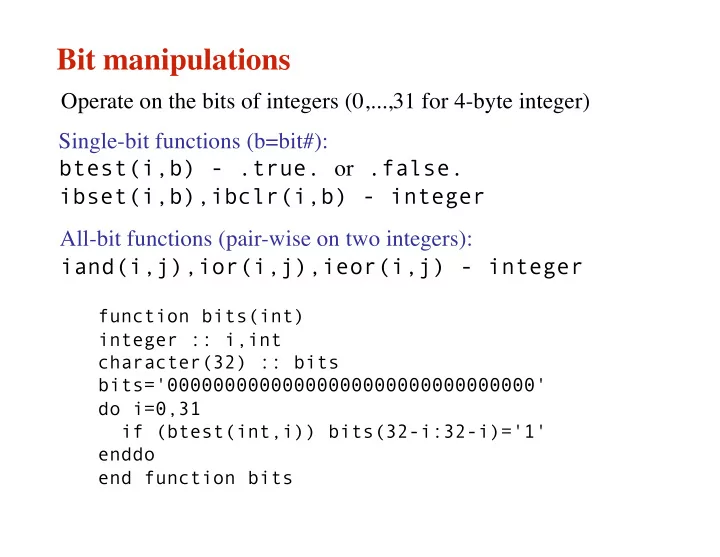

Bit manipulations Operate on the bits of integers (0,...,31 for 4-byte integer) Single-bit functions (b=bit#): btest(i,b) - .true. or .false. ibset(i,b),ibclr(i,b) - integer All-bit functions (pair-wise on two integers): iand(i,j),ior(i,j),ieor(i,j) - integer function bits(int) integer :: i,int character(32) :: bits bits='00000000000000000000000000000000' do i=0,31 if (btest(int,i)) bits(32-i:32-i)='1' enddo end function bits
Processor time subroutine cpu_time(t) - t = seconds after start of execution integer :: i,nloop real(8) :: sum real :: time0,time1 print*,'Number of operations in each loop ’ read*,nloop sum=0.0d0; call cpu_time(time0) do i=1,nloop sum=sum+dfloat(i)*dfloat(i) enddo call cpu_time(time1) print*,'Time used for s=s+i*i: ',time1-time0
Files Ø A file has a name on disk, associated unit number in program Ø File “ connected ” by open statement open(unit=10,file= ‘ a.dat ’ ) associates unit 10 with file a.dat open(10,file= ‘ a.dat ’ ) “ unit ” does not have to be written out open(10,file= ‘ a.dat ’ ,status= ‘ old ’ ) ‘ old ’ file already exists ( ‘ new ’ , ’ replace ’ ) open(10,file= ‘ a.dat ’ ,status= ‘ old ’ ,access= ‘ append ’ ) to append existing file with new data Reading and writing files: read(10,*)a write(10,*)b
Output formatting aa(1)=1; aa(2)=10; aa(3)=100; aa(4)=1000 bb(1)=1.d0; bb(2)=1.d1; bb(3)=1.d2; bb(4)=1.d3 print'(4i5)',aa write(*,'(4i5)')aa write(*,10)aa 10 format(4i5) print'(4i3)',aa print'(a,i1,a,i2,a,i3)',' one:',aa(1),' ten:',aa(2) print'(4f12.6)',bb 1 10 100 1000 1 10 100 1000 1 10 100 1000 1 10100*** one:1 ten:10 1.000000 10.000000 100.000000 1000.000000
Allocatable arrays Mechanism to assign the size of an array when running the program (i.e., not fixed when compiling) integer :: m,n real(8), allocatable :: matr(:,:) write(*,*)'Give matrix dimensions m,n: '; read*,m,n allocate(matr(m,n)) … deallocate(matr) To change the size of an already allocated array, it first has To be de-allocated, then allocated again.
Variable-sized arrays, interfaces, assumed-shape, and automatic integer :: m,n real(8), allocatable :: matr(:,:) Interface ! Interface ! Declaring the interface subroutine subroutine checkmatr checkmatr(matr matr) ! ) ! of a procedure of a procedure - include include in in real(8) :: real(8) :: matr matr(:,:) ! (:,:) ! all procedures that need it, all procedures that need it, end subroutine end subroutine checkmatr checkmatr ! ! e.g., when using “assumed shape” e.g., when using “assumed shape” end interface end interface write(*,*)'Give matrix dimensions m,n: '; read*,m,n allocate(matr(m,n)) call checkmatr(matr) end subroutine checkmatr(matr) real(8) :: matr(:,:) ! Assumed shape real(8) :: localmatr(size(matr,1),size(matr,2)) ! “Automatic” print*,size(localmatr) print*,shape(localmatr) end subroutine checkmatr
Random number generators How can deterministic algorithms give random numbers? Ø pseudo-random numbers generators Linear congruential generators; recurrence relation can generate all numbers 0,...,m-1 in seemingly random order (for suitable a, m, c odd). Test with small m=2 k , c=1: m=8 a sequence: m=4 a sequence: 1 0 1 2 3 4 5 6 7 0 1 0 1 2 3 0 2 0 1 3 7 7 7 7 7 7 2 0 1 3 3 3 3 0 1 4 5 0 1 4 5 0 3 0 1 0 1 0 4 0 1 5 5 5 5 5 5 5 4 0 1 1 1 1 5 0 1 6 7 4 5 2 3 0 6 0 1 7 3 3 3 3 3 3 7 0 1 0 1 0 1 0 1 0 8 0 1 1 1 1 1 1 1 1 m=16 a sequence: 3 0 1 4 13 8 9 12 5 0 1 4 13 8 9 12 5 0 5 0 1 6 15 12 13 2 11 8 9 14 7 4 5 10 3 0 11 0 1 12 5 8 9 4 13 0 1 12 5 8 9 4 13 0 13 0 1 14 7 12 13 10 3 8 9 6 15 4 5 2 11 0
On the computer, integer overflow is a modified modulus 2 32 (or 2 64 ) operation; can be used for random numbers: n=69069*n+1013904243 ran=0.5d0+n*0.23283064d-9 Many systems use this type of intrinsic random number generator Ø don ’ t use in serious work (period too short, not random enough) Ø 64-bit integer version is quite a good generator This one is recommended: n=2862933555777941757*n+1013904243 ran=0.5d0+dble(n)*dmul Where dmul is precalculated as dmul=1.d0/dble(2*(2_8**62-1)+1)
Addition, subtraction can also be used, e.g., m = 2 k - prime Mixed generators; longer periods, more random, e.g., mzran=iir-kkr if (mzran < 0) mzran=mzran+2147483579 iir=jjr; jjr=kkr; kkr=mzran nnr=69069*nnr+1013904243 mzran=mzran+nnr rand=0.5d0+mzran*0.23283064d-9 Four seeds; iir,jjr,kkr,nnr. Period > 10 28
Recommend
More recommend